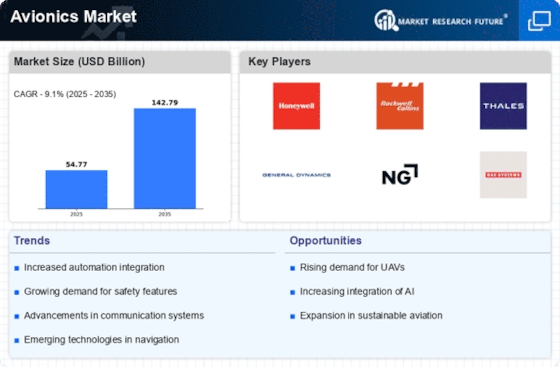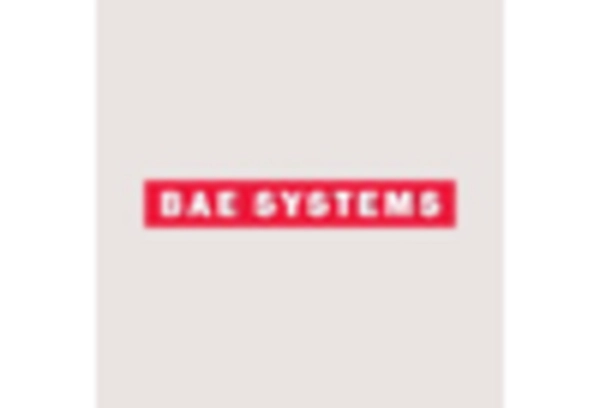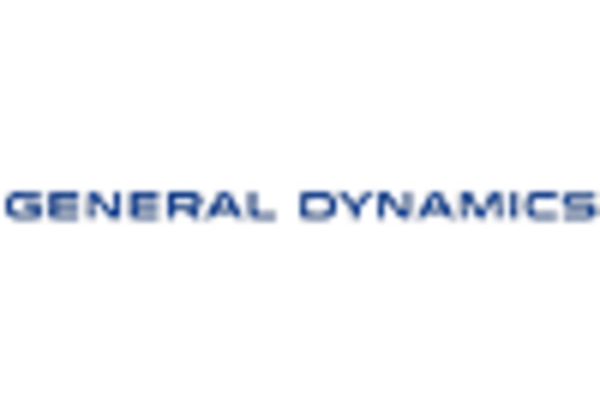Flight Control Systems
Communication Systems
Navigation Systems
Surveillance Systems
Commercial Aircraft
Military Aircraft
Helicopters
Drones
Software
Hardware
Integrated Systems
Civil Aviation
Military Aviation
North America
Europe
South America
Asia Pacific
Middle East and Africa
North America Outlook (USD Billion, 2019-2035)
North America Avionics Market by Application Type
Flight Control Systems
Communication Systems
Navigation Systems
Surveillance Systems
North America Avionics Market by Platform Type
Commercial Aircraft
Military Aircraft
Helicopters
Drones
North America Avionics Market by Technology Type
Software
Hardware
Integrated Systems
North America Avionics Market by End Use Type
Civil Aviation
Military Aviation
North America Avionics Market by Regional Type
US
Canada
US Outlook (USD Billion, 2019-2035)
US Avionics Market by Application Type
Flight Control Systems
Communication Systems
Navigation Systems
Surveillance Systems
US Avionics Market by Platform Type
Commercial Aircraft
Military Aircraft
Helicopters
Drones
US Avionics Market by Technology Type
Software
Hardware
Integrated Systems
US Avionics Market by End Use Type
Civil Aviation
Military Aviation
CANADA Outlook (USD Billion, 2019-2035)
CANADA Avionics Market by Application Type
Flight Control Systems
Communication Systems
Navigation Systems
Surveillance Systems
CANADA Avionics Market by Platform Type
Commercial Aircraft
Military Aircraft
Helicopters
Drones
CANADA Avionics Market by Technology Type
Software
Hardware
Integrated Systems
CANADA Avionics Market by End Use Type
Civil Aviation
Military Aviation
Europe Outlook (USD Billion, 2019-2035)
Europe Avionics Market by Application Type
Flight Control Systems
Communication Systems
Navigation Systems
Surveillance Systems
Europe Avionics Market by Platform Type
Commercial Aircraft
Military Aircraft
Helicopters
Drones
Europe Avionics Market by Technology Type
Software
Hardware
Integrated Systems
Europe Avionics Market by End Use Type
Civil Aviation
Military Aviation
Europe Avionics Market by Regional Type
Germany
UK
France
Russia
Italy
Spain
Rest of Europe
GERMANY Outlook (USD Billion, 2019-2035)
GERMANY Avionics Market by Application Type
Flight Control Systems
Communication Systems
Navigation Systems
Surveillance Systems
GERMANY Avionics Market by Platform Type
Commercial Aircraft
Military Aircraft
Helicopters
Drones
GERMANY Avionics Market by Technology Type
Software
Hardware
Integrated Systems
GERMANY Avionics Market by End Use Type
Civil Aviation
Military Aviation
UK Outlook (USD Billion, 2019-2035)
UK Avionics Market by Application Type
Flight Control Systems
Communication Systems
Navigation Systems
Surveillance Systems
UK Avionics Market by Platform Type
Commercial Aircraft
Military Aircraft
Helicopters
Drones
UK Avionics Market by Technology Type
Software
Hardware
Integrated Systems
UK Avionics Market by End Use Type
Civil Aviation
Military Aviation
FRANCE Outlook (USD Billion, 2019-2035)
FRANCE Avionics Market by Application Type
Flight Control Systems
Communication Systems
Navigation Systems
Surveillance Systems
FRANCE Avionics Market by Platform Type
Commercial Aircraft
Military Aircraft
Helicopters
Drones
FRANCE Avionics Market by Technology Type
Software
Hardware
Integrated Systems
FRANCE Avionics Market by End Use Type
Civil Aviation
Military Aviation
RUSSIA Outlook (USD Billion, 2019-2035)
RUSSIA Avionics Market by Application Type
Flight Control Systems
Communication Systems
Navigation Systems
Surveillance Systems
RUSSIA Avionics Market by Platform Type
Commercial Aircraft
Military Aircraft
Helicopters
Drones
RUSSIA Avionics Market by Technology Type
Software
Hardware
Integrated Systems
RUSSIA Avionics Market by End Use Type
Civil Aviation
Military Aviation
ITALY Outlook (USD Billion, 2019-2035)
ITALY Avionics Market by Application Type
Flight Control Systems
Communication Systems
Navigation Systems
Surveillance Systems
ITALY Avionics Market by Platform Type
Commercial Aircraft
Military Aircraft
Helicopters
Drones
ITALY Avionics Market by Technology Type
Software
Hardware
Integrated Systems
ITALY Avionics Market by End Use Type
Civil Aviation
Military Aviation
SPAIN Outlook (USD Billion, 2019-2035)
SPAIN Avionics Market by Application Type
Flight Control Systems
Communication Systems
Navigation Systems
Surveillance Systems
SPAIN Avionics Market by Platform Type
Commercial Aircraft
Military Aircraft
Helicopters
Drones
SPAIN Avionics Market by Technology Type
Software
Hardware
Integrated Systems
SPAIN Avionics Market by End Use Type
Civil Aviation
Military Aviation
REST OF EUROPE Outlook (USD Billion, 2019-2035)
REST OF EUROPE Avionics Market by Application Type
Flight Control Systems
Communication Systems
Navigation Systems
Surveillance Systems
REST OF EUROPE Avionics Market by Platform Type
Commercial Aircraft
Military Aircraft
Helicopters
Drones
REST OF EUROPE Avionics Market by Technology Type
Software
Hardware
Integrated Systems
REST OF EUROPE Avionics Market by End Use Type
Civil Aviation
Military Aviation
APAC Outlook (USD Billion, 2019-2035)
APAC Avionics Market by Application Type
Flight Control Systems
Communication Systems
Navigation Systems
Surveillance Systems
APAC Avionics Market by Platform Type
Commercial Aircraft
Military Aircraft
Helicopters
Drones
APAC Avionics Market by Technology Type
Software
Hardware
Integrated Systems
APAC Avionics Market by End Use Type
Civil Aviation
Military Aviation
APAC Avionics Market by Regional Type
China
India
Japan
South Korea
Malaysia
Thailand
Indonesia
Rest of APAC
CHINA Outlook (USD Billion, 2019-2035)
CHINA Avionics Market by Application Type
Flight Control Systems
Communication Systems
Navigation Systems
Surveillance Systems
CHINA Avionics Market by Platform Type
Commercial Aircraft
Military Aircraft
Helicopters
Drones
CHINA Avionics Market by Technology Type
Software
Hardware
Integrated Systems
CHINA Avionics Market by End Use Type
Civil Aviation
Military Aviation
INDIA Outlook (USD Billion, 2019-2035)
INDIA Avionics Market by Application Type
Flight Control Systems
Communication Systems
Navigation Systems
Surveillance Systems
INDIA Avionics Market by Platform Type
Commercial Aircraft
Military Aircraft
Helicopters
Drones
INDIA Avionics Market by Technology Type
Software
Hardware
Integrated Systems
INDIA Avionics Market by End Use Type
Civil Aviation
Military Aviation
JAPAN Outlook (USD Billion, 2019-2035)
JAPAN Avionics Market by Application Type
Flight Control Systems
Communication Systems
Navigation Systems
Surveillance Systems
JAPAN Avionics Market by Platform Type
Commercial Aircraft
Military Aircraft
Helicopters
Drones
JAPAN Avionics Market by Technology Type
Software
Hardware
Integrated Systems
JAPAN Avionics Market by End Use Type
Civil Aviation
Military Aviation
SOUTH KOREA Outlook (USD Billion, 2019-2035)
SOUTH KOREA Avionics Market by Application Type
Flight Control Systems
Communication Systems
Navigation Systems
Surveillance Systems
SOUTH KOREA Avionics Market by Platform Type
Commercial Aircraft
Military Aircraft
Helicopters
Drones
SOUTH KOREA Avionics Market by Technology Type
Software
Hardware
Integrated Systems
SOUTH KOREA Avionics Market by End Use Type
Civil Aviation
Military Aviation
MALAYSIA Outlook (USD Billion, 2019-2035)
MALAYSIA Avionics Market by Application Type
Flight Control Systems
Communication Systems
Navigation Systems
Surveillance Systems
MALAYSIA Avionics Market by Platform Type
Commercial Aircraft
Military Aircraft
Helicopters
Drones
MALAYSIA Avionics Market by Technology Type
Software
Hardware
Integrated Systems
MALAYSIA Avionics Market by End Use Type
Civil Aviation
Military Aviation
THAILAND Outlook (USD Billion, 2019-2035)
THAILAND Avionics Market by Application Type
Flight Control Systems
Communication Systems
Navigation Systems
Surveillance Systems
THAILAND Avionics Market by Platform Type
Commercial Aircraft
Military Aircraft
Helicopters
Drones
THAILAND Avionics Market by Technology Type
Software
Hardware
Integrated Systems
THAILAND Avionics Market by End Use Type
Civil Aviation
Military Aviation
INDONESIA Outlook (USD Billion, 2019-2035)
INDONESIA Avionics Market by Application Type
Flight Control Systems
Communication Systems
Navigation Systems
Surveillance Systems
INDONESIA Avionics Market by Platform Type
Commercial Aircraft
Military Aircraft
Helicopters
Drones
INDONESIA Avionics Market by Technology Type
Software
Hardware
Integrated Systems
INDONESIA Avionics Market by End Use Type
Civil Aviation
Military Aviation
REST OF APAC Outlook (USD Billion, 2019-2035)
REST OF APAC Avionics Market by Application Type
Flight Control Systems
Communication Systems
Navigation Systems
Surveillance Systems
REST OF APAC Avionics Market by Platform Type
Commercial Aircraft
Military Aircraft
Helicopters
Drones
REST OF APAC Avionics Market by Technology Type
Software
Hardware
Integrated Systems
REST OF APAC Avionics Market by End Use Type
Civil Aviation
Military Aviation
South America Outlook (USD Billion, 2019-2035)
South America Avionics Market by Application Type
Flight Control Systems
Communication Systems
Navigation Systems
Surveillance Systems
South America Avionics Market by Platform Type
Commercial Aircraft
Military Aircraft
Helicopters
Drones
South America Avionics Market by Technology Type
Software
Hardware
Integrated Systems
South America Avionics Market by End Use Type
Civil Aviation
Military Aviation
South America Avionics Market by Regional Type
Brazil
Mexico
Argentina
Rest of South America
BRAZIL Outlook (USD Billion, 2019-2035)
BRAZIL Avionics Market by Application Type
Flight Control Systems
Communication Systems
Navigation Systems
Surveillance Systems
BRAZIL Avionics Market by Platform Type
Commercial Aircraft
Military Aircraft
Helicopters
Drones
BRAZIL Avionics Market by Technology Type
Software
Hardware
Integrated Systems
BRAZIL Avionics Market by End Use Type
Civil Aviation
Military Aviation
MEXICO Outlook (USD Billion, 2019-2035)
MEXICO Avionics Market by Application Type
Flight Control Systems
Communication Systems
Navigation Systems
Surveillance Systems
MEXICO Avionics Market by Platform Type
Commercial Aircraft
Military Aircraft
Helicopters
Drones
MEXICO Avionics Market by Technology Type
Software
Hardware
Integrated Systems
MEXICO Avionics Market by End Use Type
Civil Aviation
Military Aviation
ARGENTINA Outlook (USD Billion, 2019-2035)
ARGENTINA Avionics Market by Application Type
Flight Control Systems
Communication Systems
Navigation Systems
Surveillance Systems
ARGENTINA Avionics Market by Platform Type
Commercial Aircraft
Military Aircraft
Helicopters
Drones
ARGENTINA Avionics Market by Technology Type
Software
Hardware
Integrated Systems
ARGENTINA Avionics Market by End Use Type
Civil Aviation
Military Aviation
REST OF SOUTH AMERICA Outlook (USD Billion, 2019-2035)
REST OF SOUTH AMERICA Avionics Market by Application Type
Flight Control Systems
Communication Systems
Navigation Systems
Surveillance Systems
REST OF SOUTH AMERICA Avionics Market by Platform Type
Commercial Aircraft
Military Aircraft
Helicopters
Drones
REST OF SOUTH AMERICA Avionics Market by Technology Type
Software
Hardware
Integrated Systems
REST OF SOUTH AMERICA Avionics Market by End Use Type
Civil Aviation
Military Aviation
MEA Outlook (USD Billion, 2019-2035)
MEA Avionics Market by Application Type
Flight Control Systems
Communication Systems
Navigation Systems
Surveillance Systems
MEA Avionics Market by Platform Type
Commercial Aircraft
Military Aircraft
Helicopters
Drones
MEA Avionics Market by Technology Type
Software
Hardware
Integrated Systems
MEA Avionics Market by End Use Type
Civil Aviation
Military Aviation
MEA Avionics Market by Regional Type
GCC Countries
South Africa
Rest of MEA
GCC COUNTRIES Outlook (USD Billion, 2019-2035)
GCC COUNTRIES Avionics Market by Application Type
Flight Control Systems
Communication Systems
Navigation Systems
Surveillance Systems
GCC COUNTRIES Avionics Market by Platform Type
Commercial Aircraft
Military Aircraft
Helicopters
Drones
GCC COUNTRIES Avionics Market by Technology Type
Software
Hardware
Integrated Systems
GCC COUNTRIES Avionics Market by End Use Type
Civil Aviation
Military Aviation
SOUTH AFRICA Outlook (USD Billion, 2019-2035)
SOUTH AFRICA Avionics Market by Application Type
Flight Control Systems
Communication Systems
Navigation Systems
Surveillance Systems
SOUTH AFRICA Avionics Market by Platform Type
Commercial Aircraft
Military Aircraft
Helicopters
Drones
SOUTH AFRICA Avionics Market by Technology Type
Software
Hardware
Integrated Systems
SOUTH AFRICA Avionics Market by End Use Type
Civil Aviation
Military Aviation
REST OF MEA Outlook (USD Billion, 2019-2035)
REST OF MEA Avionics Market by Application Type
Flight Control Systems
Communication Systems
Navigation Systems
Surveillance Systems
REST OF MEA Avionics Market by Platform Type
Commercial Aircraft
Military Aircraft
Helicopters
Drones
REST OF MEA Avionics Market by Technology Type
Software
Hardware
Integrated Systems
REST OF MEA Avionics Market by End Use Type
Civil Aviation
Military Aviation


















Leave a Comment